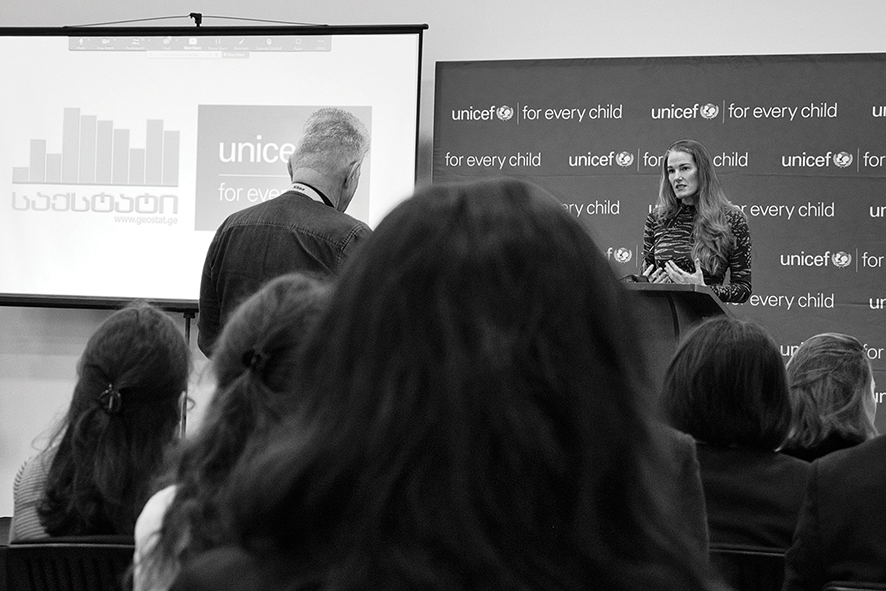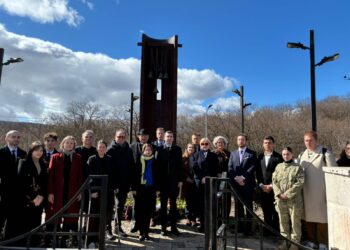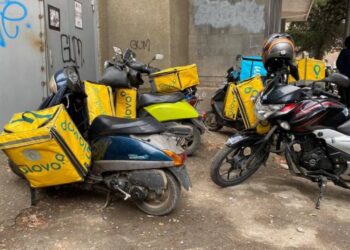I was glad to have the opportunity to attend a recent UNICEF event in Tbilisi, on April 20. The acronym stands for United Nations International Children’s Fund, with the “E” originally meaning “emergency” when it was founded in 1946 to provide developmental and humanitarian aid to the world’s children.
The Tbilisi event was the presentation of UNICEF’s and GeoStat’s latest Child Welfare Survey in Georgia, an important indicator of how the country is doing in relation to its younger citizens.
Its presenters were: Dr. Ghassan Khalil, UNICEF Representative in Georgia, just before he departs this role; Mikheil Sarjveladze, Chairperson of the Human Rights and Civil Integration Committee of the Parliament of Georgia; Niko Tatulashvili, Prime Minister’s Advisor for Human Rights; Tamila Barkalaia, Deputy Minister, Ministry of Internally Displaced Persons from the Occupied Territories, Labor, Health and Social Affairs of Georgia; and Gogita Todradze, Executive Director of the National Statistics Office of Georgia.
Also notably present were Pamela Dale, UNICEF Regional Advisor on Social Policy, on her first visit to Georgia; Maya Kurtsikidze, UNICEF Georgia Communication Specialist; and Sofia Chaava, UNICEF Georgia Communication Officer.
This statement accompanied the presentation: “The purpose of the Child Welfare Survey was to measure children’s welfare in several core domains, including access to education, healthcare and social assistance, nutrition during school hours, safety at home, functional difficulties and stigma associated with disability.
“There is a growing consensus among child rights advocates and practitioners that monetary measures of poverty are not sufficient for capturing the deprivations that children experience. A new measure called the Child Material and Social Deprivation Index was developed that examines 16 necessities, at either the child or household level. A child is considered to be deprived if, due to lack of financial resources, the family cannot provide them with at least three of the 16 necessities.
“UNICEF is supporting the Government to monitor child welfare in Georgia, through systematically conducting high-quality studies to assess the situation and recommend solutions to the challenges.”

One of the presentation’s themes was that, although Covid-19 has adversely affected many things in Georgia, as well as throughout the world, much progress has been made both in surveying the country and in making steps towards implementing positive change in the lives of children. Issues from the survey were raised, such as the urgent need for nutritional lunches as part of school everywhere, in order to improve children’s learning; better integration of physically and mentally challenged children into school, as well as improving their lives at home; better, effective but less psychologically and physically harmful methods of disciplining children; and equal access to schooling, medical care and other positive aspects of life here for all children.
I also wondered about the mountainous regions of the country in particular, because these are the areas I have come to know best: furthest away from the big cities, with potentially the least resources and greatest disparities in infrastructure and resources. I remember how taking a thermometer to one of the schools I taught at in Upper Svaneti earned me the ire of one of my school’s directors (+3 degrees C was the lowest classroom temperature I found). The only firewood we had available to use then was very green, which meant all smoke, little fire, and less heat. This has apparently improved much since I was teaching, some 10 years ago. I would now probably not see a need to protest the unbreathable atmosphere by moving my little classes directly into the staff room… where they became both much more active and warmer. During my years, another very visible improvement was the introduction of minivan-buses: Etseri school had some children about 7 km away who used to have to either stay with nearer relatives during the school week or to walk that insane distance.
“Even though it’s my first time here [in Georgia], I’ve been working with the team for three years, and I’ve seen some amazing achievements when it comes to child welfare, child benefits in particular,” Pamela Dale told GEORGIA TODAY. “We’ve been working closely on things like the micro-simulation of child poverty, that contributed to the government’s decision to have a one-time universal child benefit to offset the impacts of Covid-19. We’ve been supporting a lot of the research that’s being undertaken by GeoStat, and it’s fantastic to see that. I’ve been impressed in person to see the commitment to collecting data and using it for policy-making. I’ll continue to follow things closely, and I do want to make one additional plug. One case that we often use in reflecting on Georgia in the regional experience is the work on the reform of child disability assessment, on support to children with disabilities. It’s an area that nobody has done perfectly yet, but the work that’s been done on the reform of disability assessment is really a game-changer. I do want to point that out in particular.”
“During my four and a half years in Georgia, I have enjoyed delivering, with the wonderful team of the UNICEF Georgia Country Office, for every child, every life, all the time,” Dr. Ghassan Khalil told GEORGIA TODAY. “I am so grateful to the government, to the parliament, to our civil society partners, to everyone who has supported us in UNICEF, to be able to deliver. And one thing I would like to mention: the Court of the Rights of the Child in Georgia, a wonderful tool to improve the life of every child here.”
The full Report can be found here, for those who are interested.
It is a vital topic in this country and everywhere. One unanimous opinion of all those presenting the Report was that, in the geographic region in the last few years, Georgia is doing best in seeing child welfare documented and improved on. For this we can be most glad. While there is still much to be done, as maybe there always will be, we are making significant progress in improving children’s lives.
Congratulations to UNICEF Georgia, GeoStat and the parents and patrons of children everywhere here.
By Tony Hanmer
Tony Hanmer has lived in Georgia since 1999, in Svaneti since 2007, and been a weekly writer and photographer for GT since early 2011. He runs the “Svaneti Renaissance” Facebook group, now with nearly 2000 members, at www.facebook.com/groups/SvanetiRenaissance/
He and his wife also run their own guest house in Etseri: www.facebook.com/hanmer.house.svaneti














